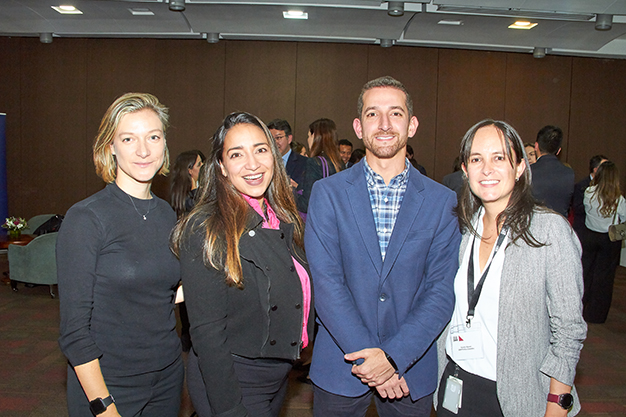Event Report
On the 8th of November, the Legal 500’s Margherita Birri and David Freeman hosted the Diversity and Inclusion Forum Colombia 2022 in Bogotá, in association with Holland & Knight.
Not everyone benefits from the same privileges and not everyone is able to choose. We do not decide where we are born or the environment surrounding us. Circumstances vary from person to person. Juan Pablo Castillo, Director of corporate affairs for Sodexo Colombia, explained why people ended up with narcotraffic or paramilitary groups. ‘Sometimes, crime just happens to be the only way. People get offered an opportunity and they accept it as they do not have other choices. They are stigmatised because, for instance, they are extremely poor, or because they were in prison. Circumstances lead them to it, people are victims of the circumstances. When we spoke to these groups, it came out that they did not even have a political belief, they are all victims of a war that could not be controlled.’
Nonetheless, they should be given a second opportunity. Sodexo currently offers a series of programmes such as ‘Programa soluciones’, a multisectoral initiative with the scope of promoting the employability and labour inclusion of people affected by the armed conflict in Colombia.
‘We seek to reintegrate them into society through a differential approach’. Paula Guerra Tamara, VP of corporate affairs and strategy for ETB, spoke about the ninis: ‘they neither study nor work’, a progressive problem in countries with unstable and unequal economies. ‘Most of them are women and they are around 18 years old. It is important to encourage them, to give them the tools to come out of their shell. Most of these young people do not even know how they feel. They face internal and external barriers, not only they are isolated from society, but they also do not know what or how to feel within themselves. This is why it is important that companies help them to break this chain by offering training programmes’.
Paola Ximena Hernandez, head of social responsibility of Sodimac Colombia, pointed out how crucial it is to also have a disability programme in a company. ‘Instead of looking at people’s disabilities, we should be looking at their abilities and empowering them. Companies should contribute to helping people reach their full potential, regardless of their disabilities. Everyone can access the formal labour market if well-supported. And from there, we should demand the same salary as any other employee. Furthermore, talking from my experience at Sodimac which offers this type of support, I can tell you that, by doing this, people want to do their best as it represents an honour to be treated as any other person. They get to show the value they have’.
As Norberto Quintana, partner at Holland & Knight reminded the audience, ‘each one of you has the opportunity to influence. Our personal issues should not get in the way. On the contrary, companies should implement policies that ensure a climate of professional respect and value for the difference of the team. It is the ‘difference’ what generates a proliferation of ideas and critical thinking. The only thing that counts should be our dedication to the job and commitment to that project, not our sexual orientation nor any other personal issue. Diversity and inclusion policies send the clear message that the context of dignity at work allows one to bring out the best in oneself. It is a fact that the most diverse teams have the highest degree of accuracy and the lowest degree of error’.
Concluding the panel, Paola Ximena highlighted the importance to also educate clients. ‘We have encountered a lot of shocked reactions from clients regarding our diversity and inclusive policies. It is our responsibility to make them see how valuable everyone is. By doing so, by offering programmes to our clients too, we allow them not only to expand their vision but to also learn how to deal with diversities in their lives too’. We should all contribute to a fairer and more inclusive society for all and explain what it is like to live in a certain condition.
While our first panel embraced a conversation on diversity overall, the second panel focused more specifically on women in law. Despite having inclusive policies, we still see a lot of conscious or unconscious bias regarding the way we approach both women and men. Women are still conceived as being the ‘weak part’ of the two genders and the ones who are good at multitasking.
However, as Juliana Saa, partner of Holland & Knight specified, ‘we were not born multitasking, we had to become multitasking’. Nicolás Rozo Villaraga, legal head of UBITS, born and raised in a matriarchy, recalled how painful it was to see a woman like his grandmother, extremely clever, being dependent on his grandfather for work as she was unable to access it. ‘Machismo still persists, as well as micromachismo accompanied by notions of women as being weak or necessarily associated to being the primary caregiver’.
Echoing Nicolas’s words, Alex Aguirre, partner of Holland & Knight, stated how the same qualities vary if associated with a woman. For instance, ‘being ambitious or assertive is not considered a quality if a woman has it’. Women are not promoted as quickly as men, and there is not much inclusion at the managerial level. Another important point raised in the panel was discrimination within the same gender. As Juliana highlighted, ‘it is an issue not to get married nor to have kids for women themselves. It is considered outrageous.’ ‘We should change the way we consider ourselves, the way through which we ask for things. It is important that the change comes from us too’ explained Camila Silva, legal manager, of Banca de Inversión Bancolombia.
The lesson our panelits left us with is to not limit ourselves because of our gender, because of the perpetuated stereotype. None should be disqualified for that.

